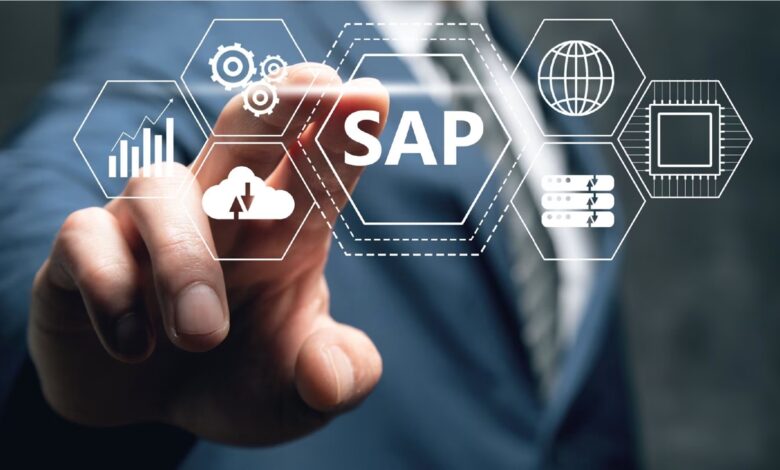Top 10 Benefits of SAP ERP System for SMEs in 2024

Enterprise Resource Planning, sometimes known as ERP, is a business that is currently poised for growth and development. ERP software, which functions to automate company activities, is essential for any business, regardless of its size. The SAP ERP system is the most effective method for accomplishing this goal. It is natural for many business owners to be concerned about the efficacy of SAP ERP systems for SMEs because the process of implementing it is a lengthy and complicated one. Within the context of this article, we are going to discuss the reasons why it is essential SAP ERP systems for SME companies.
Why is ERP Important for Your Business?
An enterprise resource planning (ERP) software system is provided with the automation, integration, and intelligence that are necessary for the efficient functioning of all day-to-day corporate processes. This software system is sometimes referred to as “the central nervous system of an enterprise.” The ERP system should contain the majority of an organization’s data, if not all of it, in order to establish a single source of truth throughout the whole organization.
For the purpose of promptly closing the books, finance requires an ERP. In order to manage all of the customer orders, sales requires ERP. In order to provide clients with the appropriate goods and services in a timely manner, logistics is dependent on ERP software that functions well. Accounting payable requires ERP in order to pay suppliers in a timely and accurate manner. In order for management to make choices in a timely manner, they require quick visibility into the performance of the organization. Additionally, banking institutions and shareholders are in need of precise financial records, and as a result, they rely on the ERP system to provide them with dependable data and analysis.
The increasing rate of adoption of enterprise resource planning (ERP) software is illustrative of the significance of ERP. “The global ERP software market is projected to reach seventy-eight billion dollars by the year 2026, growing at a compound annual growth rate of ten percent from 2019 to 2026,” says G2.
Read More: How Can Contract Management Software Help Your Business?
Top 10 Benefits of SAP ERP in 2024
Here are some of the reasons why businesses all over the world are implementing ERP software.
1. Data Management for Industry Leaders
When it comes to evaluating the success of a business and assisting in the establishment of future goals, performance metrics and measures are essential components. Nevertheless, when a company grows, it will become increasingly difficult to manually calculate the sales margin, profit ratios, and other indicators of a similar nature. By enabling employees from all over the firm to examine common data without the need to keep manual records, enterprise resource planning (ERP) technology brings a degree of automation to the business itself. The development of synchronized reports on significant company indicators is also made possible as a result of this. It is essential to have instant access to information in order to make decisions in a timely manner.
2. Efficient in terms of cost
Additionally, it helps reduce the costs associated with administration and operations by making use of information that is both accurate and up to date. Additionally, it helps manufacturers to exercise control over operations, prevent delays in manufacturing, and break up information, which ultimately leads to government officials making judgments in a manner that is far more effective.
3. Prevents Duplication and Guarantees Transparency in the Process
The existence of duplicate records and data entries will no longer be a problem once all of your company’s information is shared in a single database. This is because the system will automatically report the records that are now available in the system. The quality of the data that enables you to make exact photos in a variety of different settings is improved as a result of this. While this is happening, the level of transparency that your company possesses will be elevated to new levels. Whether it be your inventory product level, purchase orders, or billing and delivery, the application of the ERP system will screen and monitor every marginal operation and activity, offering a clear view of the execution of the tasks with total clarity. This is true regardless of whether the information is being screened and monitored.
4. Redesign the effectiveness of performance
The enterprise resource planning system eliminates the need for repetitive procedures and considerably reduces the amount of data entry that must be done manually. This not only increases user productivity but also decreases the likelihood of incorrect data, which could lead to costly errors in corporate operations. In addition, the implementation of the ERP system will improve day-to-day operations of the firm by streamlining business procedures. This will make it easier and more efficient for businesses to collect information, regardless of the location in which they are employing their employees. It can be thought of as an additional feature that is designed to keep organizations on track, to pay attention to every detail, and to simplify and improve the efficiency of working life for everyone involved, from the people who use the program to the customers.
5. Integration with Aspects of Other Participants in the Value Chain
The Enterprise Resource Planning (ERP) idea extends beyond the confines of business by incorporating other linkages in the value chain, such as consumers and suppliers. As a result, the company transforms into a significant partner that may reap the benefits of a competitive advantage by actively participating in the design and development of new products that enhance the quality of their experience. From the perspective of the customers, enterprise resource planning (ERP) gives you the ability to obtain more information of a higher quality, which enables you to modify production orders and purchase the things you need. On the other hand, we will be able to get a database of our clients that is comprised of different segments, which will enable us to conduct out marketing activities that are directed at particular segments.
6. Mobility that is excessive
Enterprise resource planning software has the ability to put customers at the center of its attention. It provides deployment methods that will bring street sales representatives the same opportunities as in-office customers to utilize ERP wherever they need to. This is a significant advantage of the program. Users of enterprise resource planning software are able to access a centralized database from any location in which they are working and from a variety of devices, including your laptop, tablet, or mobile phone. It is essential for enterprise resource planning (ERP) software to be adaptable since it boosts productivity and makes data accessible regardless of where you are.
7. Extremely adaptable to individual preferences
Due to the fact that the requirements of every business are different, every business receives a one-of-a-kind system. It takes into account the operational requirements as well as the departmental requirements. ERP systems are simple, adaptive, and flexible in their design. It is clear from this that it is easy for each and every worker to make use of it. It is adaptable due to the fact that multiple system modules are available for different departments, such as those for sales and distribution, product management, finance, and staff management.
The fact that the system may be accessed through mobile devices contributes to its adaptability. Because of this, employees or management can utilize the software from virtually any location around the world.
8. Complete and Consistent Analysis and Prediction
The ability to rely on individuals who are capable of providing correct information evaluations in addition to reporting is tough to achieve. Because there is no duplication of data, the ERP system eliminates the risk that was previously present. Real-time reports on every insignificant event that takes place within an organization are made available by the system. The purpose of this is to provide both performance reports and risk assessments. It monitors the changes in inventory as well as the purchases that are being made at the moment. Customers and, most importantly, managers are provided with the tools and resources necessary to produce more accurate projections through the utilization of enterprise resource planning software’s capabilities.
9.Customer Service That Can Be Trusted
Our ability to pay attention to the customer in a very short amount of time is made possible by the ERP being executed at an adequate level. It might be a challenging task to maintain client satisfaction while also properly managing sales and inventory if the data pertaining to your customers and inventories are housed on different platforms.
In addition to making it simpler to update all of the data in real time, ERP helps to ensure that information is always up to date. Because of this, customers will have easier access to information that is correct and up to date, and they will be better able to deal with their customers. Additionally, it offers us a traceability function that is far faster.
10. Security Assurance
ERP enables the organization to improve the security of its information technology systems. There will be enough protection for the core business data in two different ways: for the aim of preventing information theft or unauthorized access, and for the purpose of ensuring data security. In every other alternative, there are many levels of access or authorization that are integrated. The information, on the other hand, is centralized, and backups are scheduled automatically to ensure that there is no possibility of failure from occurring. When cloud solutions are included, the level of data security is increased even more by the fact that information is duplicated to several locations.
Conclusion
In conclusion, implementing SAP ERP (Enterprise Resource Planning) for Small and Medium-sized Enterprises (SMEs) marks a strategic move towards enhancing operational efficiency and competitiveness. SAP ERP offers a comprehensive suite of integrated applications that streamline business processes, improve data accuracy, and provide real-time insights. For SMEs, this translates into better decision-making capabilities, optimized resource utilization, and a scalable foundation for growth. The modular nature of SAP ERP allows businesses to tailor the system to their specific needs, ensuring a customized and flexible solution. While the initial investment may seem significant, the long-term benefits in terms of improved productivity, cost savings, and overall business agility make SAP ERP a valuable asset for SMEs aiming to navigate and succeed in a dynamic business environment. Ultimately, choosing SAP ERP is not just an investment in technology but a strategic investment in the future sustainability and growth of the SME.











